|
|
|
Sort Order |
|
|
|
Items / Page
|
|
|
|
|
|
|
| Srl | Item |
| 1 |
ID:
192142
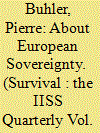

|
|
|
|
|
| Summary/Abstract |
The coining of the concept of ‘European sovereignty’ by French President Emmanuel Macron in 2017 has prompted a heated debate, reviving disputes over supranationality, the nation-state and democracy that have resonated since the inception of the European project. Macron’s intervention came at a time when a flurry of crises compelled the European Union to move from its ambition of being a ‘normative power’ to living through its ‘Machiavellian moment’, against the backdrop of the rise of new global powers and existential threats for the security of the Union and its member states. But the term ‘European sovereignty’ is a misnomer. The real issue is one of power, not of sovereignty. Power proceeds from command, hardly an attribute of the complex shared decision-making process of the EU, leaving the objective of becoming a fully-fledged power out of reach for the European polity.
|
|
|
|
|
|
|
|
|
|
|
|
|
|
|
|
| 2 |
ID:
089149
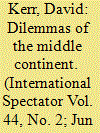

|
|
|
|
|
| Publication |
2009.
|
| Summary/Abstract |
Russia did not join the West, nor did it join the East. Russia's commitment to its strategic autonomy and independent foreign and security policy requires the preservation of a 'middle continent' that bridges and transcends Europe and Asia. Russia pursues a restorationist strategy for Eurasia but faces a three-way struggle: for its own autonomy as a great power; for resistance to absorption within the US-centred system of common strategic space; and for management of the dynamics between the emergent powers through negotiation between strategic partnerships and regionalisms. These dilemmas are even more complicated in relation to Eastern Eurasia, and in particular the Sino-Russian relationship.
|
|
|
|
|
|
|
|
|
|
|
|
|
|
|
|
| 3 |
ID:
187079
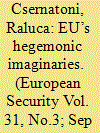

|
|
|
|
|
| Summary/Abstract |
Discourses around “strategic autonomy” and “sovereignty”, traditionally used at the state level, have been recently circulated within the EU supranational context regarding the European defence technological and industrial base, dual-use and disruptive research and innovation, and advances in the tech and digital domains. This article explores whether a high-politics logic intrinsic to “strategic autonomy” and “sovereignty” has been transplanted at the EU-level to enhance the strategic priority of various lower-politics policy fields across tech and digital policy initiatives and instruments. This logic has the hegemonic effect of shaping collective thinking and opening windows of opportunity for EU policymaking, by mainstreaming a security imaginary into broader technological governance processes. The article examines the EU’s scaled-up rhetoric around floating signifiers such as “strategic autonomy” and “technological sovereignty”, as well as the diffusion of overlapping “sovereignty” agendas enacted transversely in the defence, tech and digital sectors. The argument is that their meaning is not yet fixed but articulated via hegemonic interventions across different interconnected policy fields. This makes for conceptual “travelling” and “stretching” with a potential impact on the future of European security integration, by creating of a more unified security imaginary of the EU as a strategically independent and technologically sovereign space.
|
|
|
|
|
|
|
|
|
|
|
|
|
|
|
|
| 4 |
ID:
181687
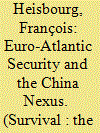

|
|
|
|
|
| Summary/Abstract |
As China has emerged over the past decade as a peer competitor of the United States, the bilateral relationship has become confrontational. Given the relatively wide range of possible strategic outcomes, Europe’s primary task is to organise itself for uncertainty. It must also assume that the US will react negatively if Europe is seen as running counter to America’s policy in the Indo-Pacific and build resilience into its policies to deal with sudden shifts in US policy. Europe’s overarching aims should be defending itself against a revisionist Russia, insulating Europe against direct Chinese coercion, helping like-minded countries prevent China from overwhelming the rules-based international order and avoiding a major war between nuclear powers. Despite the acrimony in the China–US relationship, the fear of nuclear annihilation that helped keep the Cold War cold is notably absent. Trust, especially among allies, is therefore paramount.
|
|
|
|
|
|
|
|
|
|
|
|
|
|
|
|
| 5 |
ID:
147918
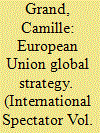

|
|
|
|
|
| Summary/Abstract |
Achieving a European Union Global Strategy (EUGS) and having it endorsed by the European Council is in itself a significant success for the High Representative/Vice President (HR/VP) Federica Mogherini. This effort to develop a new strategic document for EU’s external action was long overdue as the 2003 European Security Strategy (ESS) was clearly outdated.
|
|
|
|
|
|
|
|
|
|
|
|
|
|
|
|
| 6 |
ID:
133649
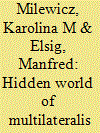

|
|
|
|
|
| Publication |
2014.
|
| Summary/Abstract |
Why do new EU democracies engage in multilateralism? The dominant explanation proposes that new democracies use international treaties to lock in domestic reforms. This article offers a novel explanation as to why new EU democracies participate in multilateral treaties. We argue that ratifying a treaty serves three external signaling purposes (recognition concerns, increasing strategic autonomy, and pleasing the European Union). We test our argument through a mix of quantitative and qualitative methods. First, we apply event history analysis. Drawing on a new ratification data set comprising 76 multilateral treaties, we illustrate the prominent role of new EU democracies in multilateralism as compared to other new democracies. Second, to assess the importance of external signaling in the decision to ratify multilateral treaties, we examine parliamentary ratification debates in selected Central and Eastern European countries. Third, we compare parliamentary discussions across European and non-European new democracies to demonstrate the different motives driving their approaches toward multilateralism.
|
|
|
|
|
|
|
|
|
|
|
|
|
|
|
|
| 7 |
ID:
177841
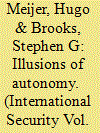

|
|
|
|
|
| Summary/Abstract |
Europe's security landscape has changed dramatically in the past decade amid Russia's resurgence, mounting doubts about the long-term reliability of the U.S. security commitment, and Europe's growing aspiration for strategic autonomy. This changed security landscape raises an important counterfactual question: Could Europeans develop an autonomous defense capacity if the United States withdrew completely from Europe? The answer to this question has major implications for a range of policy issues and for the ongoing U.S. grand strategy debate in light of the prominent argument by U.S. “restraint” scholars that Europe can easily defend itself. Addressing this question requires an examination of the historical evolution as well as the current and likely future state of European interests and defense capacity. It shows that any European effort to achieve strategic autonomy would be fundamentally hampered by two mutually reinforcing constraints: “strategic cacophony,” namely profound, continent-wide divergences across all domains of national defense policies—most notably, threat perceptions; and severe military capacity shortfalls that would be very costly and time-consuming to close. As a result, Europeans are highly unlikely to develop an autonomous defense capacity anytime soon, even if the United States were to fully withdraw from the continent.
|
|
|
|
|
|
|
|
|
|
|
|
|
|
|
|
| 8 |
ID:
135805
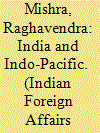

|
|
|
|
|
| Summary/Abstract |
While the Pacific pole of the Indo-Pacific is important, the primacy of the Indian Ocean in the national strategic calculus is far more critical due to energy due to energy dependency on the Middle East, increasing economic linkage with Africa, and the security of major sea lines of communication passing through the western ocean.
The Indian strategic policy framework should factor the nuances of emerging multi-polarity, and deepening of vertical and horizontal intermeshing brought about by the globalization process. While the stance of ‘strategic autonomy’ remains inviolate, the tenets of maintaining equidistance and balance among the power centres may prove to be constraints. The simultaneous management of mutually opposing paradigm across the strategic threads of politics-diplomacy-economics-security could be best served by a ‘functional transitional approach’ instead of a rigid straight-line, single point of departure policy.
|
|
|
|
|
|
|
|
|
|
|
|
|
|
|
|
| 9 |
ID:
152272
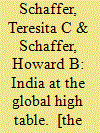

|
|
|
|
|
| Publication |
Noida, HarperCollins Publishers, 2016.
|
| Description |
x, 366p.pbk
|
| Standard Number |
9789350297858
|
|
|
|
|
|
|
|
|
|
|
|
Copies: C:1/I:0,R:0,Q:0
Circulation
| Accession# | Call# | Current Location | Status | Policy | Location |
| 058999 | 327.54/SCH 058999 | Main | On Shelf | General | |
|
|
|
|
| 10 |
ID:
108711


|
|
|
|
|
| Publication |
2011.
|
| Summary/Abstract |
Since the end of the Cold War, India's strategic horizons have moved beyond its traditional preoccupations in South Asia. India is developing a strategic role in East Asia in particular. At the same time India's strategic thinking has undergone a revolution, as the country that prided itself on non-alignment has moved closer to the West. But India's culture, history and geography still fundamentally shape its worldview. In engaging with East Asia, India is guided by a mosaic of strategic objectives about extending its sphere of influence, developing a multipolar regional system and balancing against China. The interplay of these objectives will frame India's role in East Asia in coming years.
|
|
|
|
|
|
|
|
|
|
|
|
|
|
|
|
| 11 |
ID:
139092
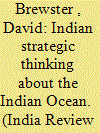

|
|
|
|
|
| Summary/Abstract |
It is sometimes claimed that India has ambitions to become the leading power in the Indian Ocean. This article examines the different streams of Indian strategic thinking about the Indian Ocean and how they will likely contribute to future Indian strategic behavior. It argues that although many among its elite aspire for India to eventually become the leading power in the Indian Ocean, there is little conceptualization as to what India needs to do to achieve this. For several reasons, including an attachment to ideas of non-alignment and strategic autonomy, Indian strategic behavior in the Indian Ocean will likely continue to be relatively reactive and constrained.
|
|
|
|
|
|
|
|
|
|
|
|
|
|
|
|
| 12 |
ID:
192933
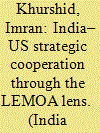

|
|
|
|
|
| Summary/Abstract |
Since Narendra Modi took office, India and the United States’ strategic ties have become stronger. It took almost 12 years to sign the ‘Logistics Exchange Memorandum of Agreement (LEMOA)’. The LEMOA offers a framework for governing the logistical assistance, supplies and services exchanged between the Indian and US forces on a reciprocal and reimbursable basis. Concerns in India’s strategic elite and political class over the endangerment of India’s strategic autonomy and compromising India’s sovereignty for a long time prevented the execution of this agreement. However, after the BJP government came to power in 2014, it negotiated this agreement with the United States. India has strategically moved closer to the United States by signing this agreement, which will have a lot of positive effects on the development of India’s strategic capabilities and the strengthening of Indian defence forces’ operational capabilities. It will also allow India to expand its strategic influence in the Indo-Pacific region. This study analyses the LEMOA, its implications for India’s strategic autonomy, and its subsequent implications for expanding India’s strategic footprint in the region.
|
|
|
|
|
|
|
|
|
|
|
|
|
|
|
|
| 13 |
ID:
135806
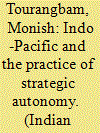

|
|
|
|
|
| Summary/Abstract |
What makes the Indo-Pacific construct appealing to Indian policymakers and the strategic community is that it gives ample scope for the practice of India’s strategic autonomy. It gives space for it to drive the emerging debates as a more direct stakeholder rather than being seen as a co-opted partner in America’s rebalancing strategy in the Asia-pacific region. while the term ‘strategic autonomy needs to be defined based on India’s capabilities and aspirations, it will augur well for India’s own interests to take into confidence other countries in the region (besides the major powers) regarding the viability of this new geopolitical and geo-economic construct. India’s rising capabilities and a sober analysis of its strategic autonomy denotes India’s ability to take foreign policy steps commensurate with its national interests. This includes striking partnerships and coalitions as and when it suits India’s priorities of balancing uninterrupted internal development amidst a stable and secure external environment in the Indo-Pacific region.
|
|
|
|
|
|
|
|
|
|
|
|
|
|
|
|
| 14 |
ID:
147913
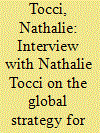

|
|
|
|
|
| Summary/Abstract |
The Global Strategy for the European Union’s Foreign And Security Policy, “Shared Vision, Common Action: A Stronger Europe”, presented at the European Council on 24 June 2016 by Federica Mogherini, High Representative of the European Union for Foreign Affairs and Security Policy and Vice President of the Commission, was drafted by Nathalie Tocci, Deputy Director of the Istituto Affari Internazionali (IAI) and co-editor of The International Spectator.
|
|
|
|
|
|
|
|
|
|
|
|
|
|
|
|
| 15 |
ID:
147917
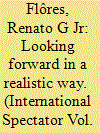

|
|
|
|
|
| Summary/Abstract |
Since taking office, High Representative and Vice President (HR/VP) Federica Mogherini, together with her perhaps closest aide, Nathalie Tocci, has led a bold and novel stance in this still sometimes misunderstood position created by the Lisbon Treaty.
|
|
|
|
|
|
|
|
|
|
|
|
|
|
|
|
| 16 |
ID:
097311
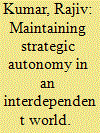

|
|
|
| 17 |
ID:
187477
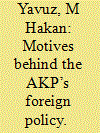

|
|
|
|
|
| Summary/Abstract |
This paper examines the role of ideas and identities in the making of the AKP’s foreign policy in Turkey. After briefly examining the institutional and international constraints on Turkish foreign policy before 2002, the discussion turns to the driving factors in three evolutionary stages of AKP’s foreign policy. It becomes apparent that a neo-Ottoman worldview and accompanying identity constitute the interpretive framework of the AKP’s political elite. The article traces how this worldview became dominant in Turkey’s policy making after the government dismantled the country’s Kemalist institutions and the AKP consolidated its political power.
|
|
|
|
|
|
|
|
|
|
|
|
|
|
|
|
| 18 |
ID:
142133
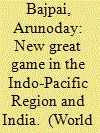

|
|
|
|
|
| Summary/Abstract |
In the post-Cold War scenario, NAM may appear out of place but its cardinal principle-'independence of foreign policy' continues to be relevant in the present context also, because India as the largest democracy with desire to play a respectful role in global affairs needs her own foreign policy choices, which are in tune with her core national interest. The principle of independence of foreign policy has resurfaced as 'strategic autonomy' in the Indian policy making circles. In the wake of the signing of the joint strategic vision statement between India and the US in January 2015, China has appreciated India's principle of 'strategic autonomy' in foreign policy. Thus, India needs to play a balancing act in the ongoing great game between the US and China for protecting her long-term interests and for peace and stability in the Indo-Pacific region.
|
|
|
|
|
|
|
|
|
|
|
|
|
|
|
|
| 19 |
ID:
179340
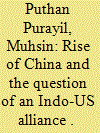

|
|
|
|
|
| Summary/Abstract |
The ongoing Ladakh crisis between India and China has accentuated a discussion on India allying with the US. However, despite India's steady growth of bilateral security relations with the US, New Delhi's response to the idea of becoming part of a formal alliance has so far been non-comittal. In such a context, the question – will the rising Chinese threat now foster a desire in India to align with the US? – is worth examining. Probing the question, this article contends that while the Ladakh crisis has indubitably heightened India's security challenges emanating from Beijing, yet the possibility of an alliance at the moment remains no more than modest. It notes several challenges and implications that prevent its emergence. They include India's attachment to strategic autonomy, the Pakistan factor, the Russia factor, the Iran factor, unresolved trade disagreements, India's fear of getting entangled in great power rivalry, and the possibility of a US-China rapprochement in the future.
|
|
|
|
|
|
|
|
|
|
|
|
|
|
|
|
| 20 |
ID:
192486
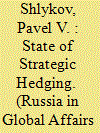

|
|
|
|
|
| Summary/Abstract |
This article analyzes the multidimensional nature of Turkey’s foreign
policy and its relations with Russia in the 2010s and the early 2020s
through the prism of strategic hedging concept. Previously, many scholars
pointed to mostly different elements of balancing in Ankara’s foreign
policy behavior. However, since the late 2010s, Turkey has systematically
positioned itself as a power aspiring for significant strategic autonomy
in international affairs, for which reason researchers had to look for new
analytical approaches to describe its behavior in the international arena and relations with its neighbors. The concept of strategic hedging allows
analyzing more accurately Turkey’s multidirectional foreign policy, which
does not correspond with the classical models of behavior typical of middle
powers, especially those engaged in military-political alliances with the
United States. The article argues that due to a complex of international
and domestic reasons Turkey has been trying to combine different types of
balancing and, more importantly, hedging. This strategy enables Turkey not
only to retain but also to enhance its strategic autonomy in international
relations. In this strategy Russia has become an important source of Turkey’s
strategic autonomy while the crisis in Ukraine, with all its negative impact
on Turkey, has opened up new opportunities.
|
|
|
|
|
|
|
|
|
|
|
|
|
|
|
|
|
|
|
|
|